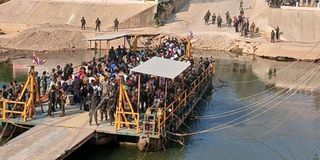Premium
64 Kenyans trafficked to Myanmar in limbo after earthquake

A view shows debris after a strong earthquake struck central Myanmar, in Mandalay, Myanmar, March 29, 2025.
African countries already struggling to rescue their nationals trafficked to Myanmar are now scrambling to check if they are safe.
The concerns came as Myanmar and Thailand experienced the heaviest earthquake yet, registering over 1,600 deaths, according to an official tally by Saturday morning.
South Africa, Kenya, Ethiopia, Nigeria, Uganda and several other African countries were facing a double tragedy: These countries have recently had the biggest number of Africans trapped in modern slavery in Myanmar.
These nationals had travelled to Myanmar, at war since 2021, and were tricked into jobs that didn’t exist. Then, they found themselves in bondage in areas administered by rebels opposed to the Burmese junta called the State Council Administration (SAC). Some 7,000 foreigners from China, southeast Asia, Africa and the Indian subcontinent were in similar conditions, Thai authorities had estimated in February.
Kenya had indicated up to 64 nationals had been rescued, but 43 of them had not yet been repatriated from Myanmar. According to a dispatch from the Ministry of Foreign and Diaspora Affairs in Nairobi, all of them had been accounted for after the earthquake on Friday.

Multinational victims of scam centres, who were trafficked into working in Myanmar and were sent to Thailand, wait for their embassies to pick them up, in Tak province, Thailand February 19, 2025.
Horrific conditions
South Africa reported that 23 nationals who had been in forced labour and torture in Myanmar had been rescued from a horrifying cyber-scam operation. Others were still there, an official said.
Lured by deceptive job offers, the South Africans found themselves imprisoned, forced to perpetrate online fraud, and subjected to horrific abuse before their rescue.
The Department of International Relations and Cooperation (DIRCO) in South Africa said it had facilitated their return on Thursday.
“These adverts promised the victims good salaries, free accommodation, comprehensive travel expenses, and other lucrative benefits. Once in Thailand, they were transported to Myanmar against their will,” said DIRCO.
The department disclosed the horrific conditions endured by the victims of a human trafficking operation for more than four months. These conditions included intimidation, physical torture, and forced labour.

138 Ethiopians, 23 Kenyans rescued from Myanmar slavery camps.
The victims were compelled to run cyber scams for 16 hours a day, facing beatings and torture if they refused. They were kept under armed guard 24 hours a day, given spoiled food and contaminated water, and denied medical treatment.
DIRCO stated that the Department of Social Development workers would assess the victims. Following this, the Directorate for Priority Crime Investigation (DPCI) would transport them to health facilities for medical evaluations.
They will also receive support for their psychological and social well-being.
“The DPCI will continue to work with all relevant government departments to ensure the safety and wellbeing of the victims, as well as the successful arrest and conviction of traffickers in South Africa,” added DIRCO.
Deeply rooted slavery
The issue of human trafficking and forced labour related to cybercrime in Myanmar is deeply rooted. It has escalated into a severe crisis, exacerbated by ongoing regional political instability. At least 700 Africans are said to have been entrapped there, most of them from Kenya, Nigeria, Ethiopia, South Africa, Senegal and various other countries.

Some of the foreigners who were rescued from Myanmar labour camps by Thai authorities.
The scale of the earthquake was only emerging on Thursday with information flow dragged by a secretive junta in Myanmar, which also doesn’t control the entire territory of what used to be called Burma.
As such, most African countries don’t even have diplomatic contacts with Myanmar and have relied on Thailand for help.
Myanmar ranks first on the Global Organized Crime Index, with a score of 8.15. According to reports, incidents of human trafficking and cyber scamming in Myanmar surged following the COVID-19 pandemic and the coup in February 2021.
In fact, the official number of those trafficked represents only a tiny fraction of the estimated 120,000 individuals the UN Human Rights Commission believes have been held captive and forced to participate in online scams across Myanmar since 2023.
Most African countries have an unemployment problem. South Africa faces one of the highest rates globally, with more than 31.9 percent of the workforce unemployed as of the fourth quarter of 2024. This has prompted many individuals to look for job opportunities overseas.
However, governments have cautioned against jobs. Kenya’s ambassador to Thailand, Lindsay Kiptiness Kimwole last month published a video warning that there are no jobs at all in Thailand or Myanmar and asked Kenyans and African in general to disregard any advertisements promising jobs.
DIRCO has cautioned South Africans to be extremely careful when applying for jobs abroad.





